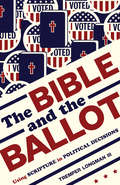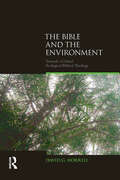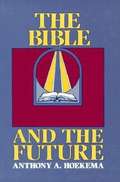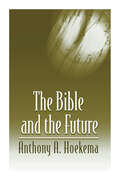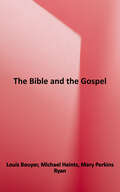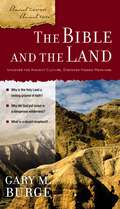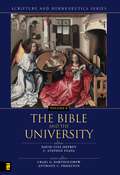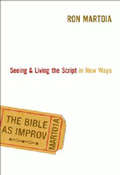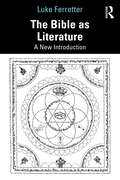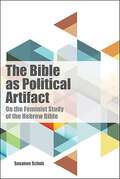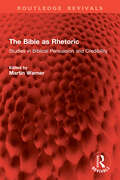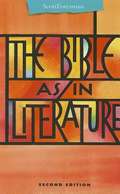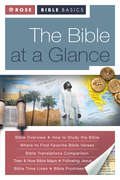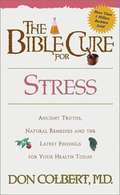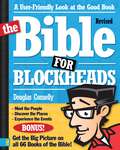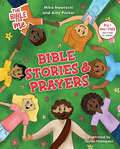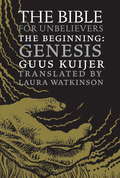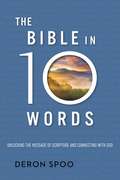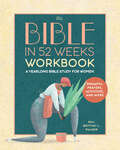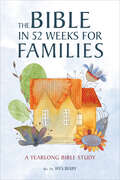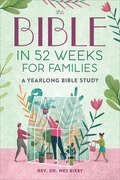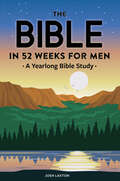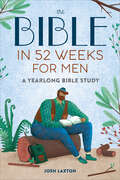- Table View
- List View
The Bible and the Ballot: Using Scripture in Political Decisions
by Tremper Longman IIIHow to read the Bible on matters of public policyChristians affirm the Bible as our standard of faith and practice. We turn to it to hear God&’s voice. But what relevance does the Bible have for the contentious public policy issues we face today? Although the Bible does not always speak explicitly to modern issues, it does give us guiding principles as we think about how we might vote or act as political figures ourselves. The Bible and the Ballot demonstrates the proper use of Scripture in contemporary political discussions. Christians regularly invoke the Bible to support their positions on many controversial political topics—gay marriage, poverty, war, religious liberty, immigration, the environment, taxes, etc.—and this book will help facilitate those conversations. Tremper Longman provides a hermeneutical approach to using the Bible in this manner, then proceeds topic by topic, citing important Scriptures to be taken into consideration in each case and offering an evangelical interpretation. Longman is careful to suggest levels of confidence in interpretation and acknowledges that often there are a range of possible applications. Each chapter includes questions to provoke further thought in individuals&’ minds or for group discussion. The Bible and the Ballot is a ready guide to understanding the Bible on issues that American Christians face today as we live within a pluralistic society.
The Bible and the Environment: Towards a Critical Ecological Biblical Theology (Biblical Challenges in the Contemporary World)
by David G. HorrellThe biblical and Christian traditions have long been seen to have legitimated and encouraged humanity's aggressive domination of nature. Biblical visions of the future, with destruction for the earth and rescue for the elect, have also discouraged any concern for the earth's future or the welfare of future generations. But we now live in a time when environmental issues are at the centre of political and ethical debate. What is needed is a new reading of the biblical tradition that can meet the challenges of the ecological issues that face humanity at the beginning of the third millennium. 'The Bible and the Environment' examines a range of biblical texts - from Genesis to Revelation - evaluating competing interpretations. The Bible provides a thoroughly ambivalent legacy. Certainly, it cannot provide straightforward teaching on care for the environment but nor can it simply be seen as an anti-ecological book. Developing an 'ecological hermeneutic' as a way of mediating between contemporary concerns and the biblical text, 'The Bible and the Environment' presents a way of productively reading the Bible in the context of contemporary ecology.
The Bible and the Future
by Anthony A. Hoekema'Anthony Hoekema brings to the study of biblical prophecy and eschatology a maturity that is rare among contemporary works on the subject. Free of sensationalism, he evinces a reverence for the Scriptures and a measured scholarship. One of the best studies on eschatology available.' ---Christianity Today
The Bible and the Future: Created In God's Image: Saved By Grace
by Anthony A. HoekemaWriting from the perspective that the coming of God's kingdom is both present and future, Hoekema covers the full range of eschatological topics in this comprehensive biblical exposition. The two major sections of the book deal with inaugurated eschatology (the "already") and future eschatology (the "not yet"). Detailed appendix, bibliography, and indexes.
The Bible and the Gospel: The Meaning of Scripture: From the God Who Speaks to the God Made Man
by Louis BouyerThis book expresses the unified nature of God’s revelation to mankind within the continuity of the history of Israel and the life of the Church. Eschewing both sterile historicism and gratuitous allegory, Bouyer provides an illuminating initiation to reading the Old and the New Testaments. For this new edition, Michael Heintz has revised the original English translation, added the previously untranslated Preface, written numerous editorial annotations, and contributed an Introduction that illuminates Bouyer and his theological vision. To paraphrase St. Jerome, “Knowledge of Scripture is knowledge of Christ.” With Bouyer as their trustworthy guide, readers can become rich in that knowledge. Equally erudite and accessible, The book is the perfect gift for students and scholars, preachers and parishioners, and anyone who seeks to know and love the Word of God.
The Bible and the Land (Ancient Context, Ancient Faith)
by Gary M. BurgeAs the early church moved away from the original cultural setting of the Bible and found its home in the west, Christians lost touch with the ancient world of the Bible. Cultural habits, the particulars of landscape, even the biblical languages soon were unknown. And the cost was enormous: Christians began reading the Bible as foreigners and missing the original images and ideas that shaped a biblical worldview. This new book by New Testament scholar Gary Burge launches a multivolume series that explores how the culture of the biblical world is presupposed in story after story of the Bible. Using cultural anthropology, ancient literary sources, and a selective use of modern Middle Eastern culture, Burge reopens the ancient biblical story and urges us to look at them through new lenses. Here he explores primary motifs from the biblical landscape—geography, water, rock, bread, etc.—and applies them to vital stories from the Bible.
The Bible and the Liturgy
by Jean DaniélouThe book primarily focuses on the three sacraments of initiation: baptism, confirmation, and the Eucharist, and follows the development of the rites of these three sacraments, from their biblical roots to their practice in the first five centuries of Christianity.
The Bible and the University (Scripture and Hermeneutics Series)
by David Lyle Jeffrey C. Stephen Evans Anthony C. Thiselton Craig BartholomewIt is well known that the Western university gradually evolved from the monastic stadium via the cathedral schools of the twelfth century to become the remarkably vigorous and interdisciplinary European institutions of higher learning that transformed Christian intellectual culture in the thirteenth and fourteenth centuries. It is equally well known that subsequent disciplinary developments in higher education, including the founding and flourishing of many of the most prestigious of North American universities, owe equally to the Protestant and perhaps particularly Calvinist influence. But that the secularized modern university that descended from these developments is now in something of an identity crisis is becoming widely – and often awkwardly – apparent. The reason most often given for the crisis is our general failure to produce a morally or spiritually persuasive substitute for the authority that undergirded the intellectual culture of our predecessors. This is frequently also a reason for the discomfort many experience in trying to address the problem, for it requires an acknowledgement, at least, that the secularization hypothesis has proven inadequate as a basis for the sustaining of coherence and general intelligibility in the university curriculum. Nowhere is this more apparent than in the disciplines of biblical studies and theology, which once were the anchor or common point of reference for theological thought, but which are now both marginalized in the curriculum and internally divided as to meaning and purpose, even where the Church itself is concerned. In this final volume of the Scripture and Hermeneutic Series, a group of distinguished scholars have sought to understand the role of the Bible in relation to the disciplines in a fresh way. Offered in a spirit of humility and experimentally, the essays here consider the historic role of the Bible in the university, the status of theological reflection regarding Scripture among the disciplines today, the special role of Scripture in the development of law, the humanities and social sciences, and finally, the way the Bible speaks to issues of academic freedom, intellectual tolerance, and religious liberty. Contributors Include: Dallas Willard William Abraham Al Wolters Scott Hahn Glenn Olsen Robert C. Roberts Byron Johnson Robert Cochran, Jr. David I. Smith John Sullivan Robert Lundin C. Stephen Evans David Lyle Jeffrey
The Bible as Improv
by Ron MartoiaEvery Christian desires to follow the Bible. But many of the things the Bible teaches—such as its instructions on how to treat slaves or its direction to sell everything one owns—seem to have little relevance to modern life. Picking and choosing what applies today leaves many readers frustrated and confused. Is it possible that Christians are asking the wrong question of Scripture? Ron Martoia suggests that the narrative sweep of the Bible is lost when it is reduced to quips and maxims. Faithfulness to the text requires faithfulness to its narrative form. Reflecting a high view of Scripture and a profound belief in its power to change lives, Martoia helps readers read the Bible so that its story shapes their own stories. In this new light, readers can move beyond the confusion about what is true today and what is “outdated.” With a passion for seeing people experience revolutionary change in their spiritual lives, Martoia shows readers how to look at the big picture of the Bible. As they will soon find out, the view is incredible.
The Bible as Literature
by Nicola Denzey David Sitino Anthony D. York Charles B. Wheeler John B. GabelEmphasizes what can be factually known about the writing of the Bible.
The Bible as Literature: A New Introduction
by Luke FerretterThis book introduces the Bible as one of the greatest works of world literature. Luke Ferretter provides a comprehensive history of the field, alongside detailed readings of the texts of the Bible and the most influential theories in the area.The Bible as Literature: A New Introduction is divided into groups of texts in the Bible by genre – the Pentateuch; the histories; the poetry; the Wisdom literature; prophecy; the Gospels; the letters; and apocalyptic writing – reflecting the majority of courses. Organized into three sections, each chapter begins with a clear introduction to current theories around who wrote and edited each Biblical book. Ferretter then offers detailed and original literary criticism of that book, encouraging readers to pursue similar literary criticism of the Bible themselves. The final section in each chapter discusses a text related to each Biblical book. These texts include visual, musical, poetic, fictional, philosophical, theological, and psychological works. Throughout the guidebook, there are also useful text boxes and discussion questions, which contextualize examples and enrich students’ understanding. This engaging and accessible introduction reveals the Bible’s significance both as literature and for literary study in light of current Biblical scholarship. It is essential reading for students and scholars of literature, Biblical studies, and cultural studies.
The Bible as Political Artifact: On The Feminist Study of the Hebrew Bible
by Susanne ScholzBiblical studies and the teaching of biblical studies are clearly changing, though it is less clear what the changes mean and how we should evaluate them. In this book, Susanne Scholz engages some of the issues as she has encountered them in the field over the last twenty years. She casts a feminist, class-critical eye on the politics of pedagogy, in higher education and in wider society alike, decrypting important developments in "the architecture of educational power." She also examines how the increasingly intercultural, interreligious, and diasporic dynamics in society inform the hermeneutical and methodological possibilities for biblical exegesis, whether the topic is rape in ancient Near Eastern legislation or Eve and Adam in the American Christian right‘s approaches. In bold strokes, Scholz lays out a program for biblical scholarship and pedagogy that connects to current events and ideas, such as the Title IX debate, inclusive language, or film. Taken as a whole, the fourteen chapters demonstrate that the foregrounding of gender, placed into its intersectional contexts, offers intriguing and valuable alternative ways of seeing the world and the Bible‘s place in it.
The Bible as Rhetoric: Studies in Biblical Persuasion and Credibility (Routledge Revivals)
by Martin WarnerFirst Published in 1990, The Bible as Rhetoric explores the ways in which the persuasive strategies employed in the biblical texts relate (both positively and negatively) to their preoccupations with religious and historical truth. The book contains pioneering interdisciplinary papers that clarify what is at issue in the apparently competing claims that the Bible should be read ‘as literature’ and ‘as scripture’.Uniquely, the volume brings together philosophers, literary critics, biblical scholars, theologians, and historians of ideas who combine the best biblical and historical scholarship with a range of contemporary approaches to the study of texts, from the deconstructive and the feminist through the Wittgensteinian to those of the heirs of the tradition of practical criticism. The volume is of importance both to those interested in the applications of contemporary literary theory and to all those concerned with the relation between religious and secular readings of the Bible.
The Bible as/in Literature: Anthology
by James S. Ackerman Thayer S. Warshaw John SweetLiterature anthology
The Bible at a Glance
by Rose PublishingRose Bible Basics: The Bible at a Glance - What You Need To Know About The BibleRose Bible Basics: The Bible at a Glance contains the basics everyone should know about the Bible. This full-color ebook contains: *A Bible Overview - summarizes each book of the Bible in 100 words or less *A Bible Time Line - compares Bible history and world history side by side *A handy guide on how to study the Bible inductively *Then & Now Bible Maps - shows where biblical events took place and where they are in relation to modern day sitesRose Bible Basics: The Bible at a Glance also contains a handy list of favorite Bible verses, Bible promises, the basics of following Jesus (forgiveness, love, prayer, tithing, salvation, serving, dealing with doubt and fear, trusting in God, and more), and an easy to understand introduction to Bible translations with a comparison chart showing the top 20 english translations. Includes color diagrams, maps, charts, illustrations, and photos throughout and discussion questions to use personally, or in small groups, new members classes, church groups, new believer classes, and homeschools.Rose Bible Basics: The Bible at a Glance combines eight of the most popular Rose pamphlets: Bible Overview, Bible Time Line, How to Study the Bible, Then and Now Bible Maps, Where to Find Favorite Bible Verses, Bible Promises, Following Jesus, and Bible Translations Comparison chart. (A $32 value for only $14.99.)
The Bible cure for Stress
by Don Colberthelp relieve tension and stress and learn how to cope with this silent killer
The Bible for Blockheads-Revised Edition: A User-Friendly Look at the Good Book
by Douglas ConnellyIf you have a hard time making sense of the Bible, The Bible for Blockheads is for you. It will transform what might seem like gobbledygook into incredible significance-enough to change your life. It can do that because the Bible is more amazing than you'
The Bible for Me: Bible Stories and Prayers
by Mike Nawrocki Amy Parker Brentwood StudiosThe Bible for Me: Bible Stories and Prayers is a new Bible storybook and the first title in The Bible for Me brand of related products for kids ages 4-8 from the team at Brentwood Studios and authors Amy Parker and Mike Nawrocki. The 50 stories are written and designed to share the story of God's people and His love for each child, in a way that it is relevant and relatable to the reader. Each story ends with a prayer where the reader can easily insert the child's name, making the stories uniquely personal. The book features fresh, colorful illustrations from Taylor Thompson Lynch. This Bible storybook was written specifically to show God's love and purpose for each unique child, making it clear that these timeless stories are meant for each and every one of us, here and now, today.
The Bible for Unbelievers: The Beginning-Genesis
by Laura Watkinson Guus KuijerOne of Northern Europe's most popular writers, Guus Kuijer was fascinated with the Bible from an early age, but was never able to believe it, no matter how hard he tried. Now, in prose that is humorous and sometimes irreverent, Kuijer reinterprets the most popular book in the world, making it new again for the twenty-first century and for the first time rendering it accessible to "unbelievers"—that is, to people who are ready to appreciate it as something other than a sacred text. The first volume of The Bible for Unbelievers tells the story of the Book of Genesis as an agnostic novel in which man's curiosity causes creation, not God alone. Kuijer explores the nagging loneliness of the universe before creation. He asks if man and woman are indeed God's handiwork or vice versa. The entire cast of characters in this Bible is imperfect, a little lawless, and at times fumbling and jealous—God included. Kuijer's afterword tells us that no story can "come to life unless the storyteller makes it his or her own." There's a charming invitation in these pages for us all to dare to revisit our founding myths and the roles we play in them. The Bible for Unbelievers is here to draw us into questions that have no answers. It does so not with fear or religiosity, but with joy.
The Bible in 10 Words: Unlocking the Message of Scripture and Connecting with God
by Deron SpooGet a better understanding of the Bible through 10 words that help define God's plan for restoring and redeeming our broken world.The Bible contains around 750,000 words-a number that would intimidate even the most seasoned readers of the Bible. Yet, from the beginning of time, God set in place a plan to bring us back to the One who loves us. Remarkably-as though God couldn't wait to tell us-this plan is telegraphed in the first few pages of the Bible and can be summed up in just 10 words: light, dust, breath, garden, river, eat, alone, naked, afraid, sweat. Deron Spoo traces each word through the Bible and explains how these words reveal God's plan for restoring our broken world. Each word is both rich in meaning and full of promise. Following the thread of each word as it appears and reappears in the Bible, The Bible in 10 Words offers a compelling glimpse of who God is and what He is saying to us.
The Bible in 52 Weeks Workbook: A Yearlong Bible Study for Women (Bible in 52 Weeks)
by Rev. Brittini L. PalmerDeepen your faith each day with the official workbook based on USA Today bestseller The Bible in 52 WeeksSpending time with scripture is a powerful form of spiritual self-care, and this workbook encourages you to practice it regularly! It's designed to be used alone, or as a supplement to the bestselling The Bible in 52 Weeks: A Yearlong Bible Study for Women, diving much deeper with even more activities, questions, and thoughtful writing prompts that will inspire you for a full year and beyond.For Christian women today—Find thoughtfully curated discussion topics that focus on what it means to be a modern woman of faith, like overcoming challenges, setting boundaries, and knowing your purpose.A simple study plan—Each week offers 6 passages to read, followed by a lesson that includes a devotion on the week's theme, multiple prompts to answer, an activity to try, and a prayer to close out the week.One year of practice—Experience 52 weekly lessons that touch on every chapter of the Bible, giving you the opportunity to truly understand God's Word.Try out the original—This book can be used on its own or as a follow-up to mega-popular The Bible in 52 Weeks!Discover your yearlong roadmap to deepening your connection with God—one day at a time.
The Bible in 52 Weeks for Families: A Yearlong Bible Study (Bible in 52 Weeks)
by Rev. Dr. Wes BixbyA journey through the Bible to nurture your family's faith This book features a yearlong reading plan designed to guide your family through the entire Bible—a few verses at a time. With weekly commentaries, discussion questions, and activities, it will spark exciting conversations and inspire every family member to apply God's teachings to their own life. All you need is a Bible—Every week's entry includes six daily readings from your Bible (with a day to catch up), a brief lesson on the theme for the week, a few questions to talk through, and a fun activity for the whole family to try. Touch on every chapter—Explore every verse of the Bible over the course of a year with a simple schedule that only requires about 15 minutes of reading each day and one study session each week. Made for families—Lessons are appropriate for all ages, so even young children can join in on the conversation. Connect with His Word and spend quality time together with this Bible study guide for families.
The Bible in 52 Weeks for Families: A Yearlong Bible Study (Bible in 52 Weeks)
by Rev. Dr. Wes BixbyAn interactive, yearlong journey through the entire Bible for families—Part of the USA Today bestselling series with the original The Bible in 52 Weeks!Make Bible study even more meaningful by getting the whole family involved! This Bible study guide features a weekly reading plan to lead your family through the entire Bible, a few verses at a time. With weekly insights, discussion questions, and activities, it will spark deeper conversations about faith and inspire every family member to use God's teachings in their own life.All you need is your Bible—Dive into a new entry each week that includes six daily readings from your Bible (and a day to rest), a brief lesson on the theme for the week, a few questions to talk through, and a fun activity to try.One year of reflection—Touch on every chapter of the Bible over the course of a year with a simple schedule that only requires about fifteen minutes of reading each day and one study session each week.Made for families— These lessons are appropriate for all ages so adults, teens, and even young children can learn and grow in their faith.Study with the bestselling series—Find more ways to connect to His word with The Bible in 52 Weeks for Men and the mega-popular, USA Today bestselling The Bible in 52 Weeks for women.Bring your family closer together and closer to God with this yearlong Bible study!
The Bible in 52 Weeks for Men: A Yearlong Bible Study
by Josh LaxtonLearn to live the lessons of the Bible for a more devoted, inspired year Using the Bible to apply God's lessons to everyday life is an integral part of being a Christian man. With The Bible in 52 Weeks for Men, you can develop a rewarding and lasting relationship with God. With in-depth lessons and practical applications tailored to men's lives, you will cultivate a richer connection with God and His teachings over the course of a year. Get closer to Him with exercises and reading guides that walk you through each part of the Scripture. Use this Bible study guide for: Manageable readings—With lessons that take just 15 to 20 minutes daily, you can create a routine for embracing God's Word no matter how busy your schedule gets. Practical prompts—Contemplate God's teachings and reinforce your commitment to Him with journal exercises that inspire reflection on relevant topics, like relationships, family, work, and health. Group discussion tools—Deepen your faith with your fellow Christians with prompts and thought-starters designed for larger groups. Strengthen your connection with God and bring His Word into your life with The Bible in 52 Weeks for Men.
The Bible in 52 Weeks for Men: A Yearlong Bible Study (Bible in 52 Weeks)
by Josh LaxtonAn interactive, yearlong journey through the entire Bible for men—Part of the USA Today bestselling series with the original The Bible in 52 Weeks!Applying the wisdom of the Bible to your life is an integral part of being a Christian man, but it's not always easy to find the time for Bible study. The Bible in 52 Weeks for Men gives you a clear path to connect with the Lord, guiding you as you read the Bible every day for one year. It's an easy reading plan that takes you through Scripture week by week, with included lessons and questions designed to help you strengthen your faith and live by His word.A full year of readings—Learn from every chapter of the Bible with a weekly format that only requires about fifteen minutes of reading each day and only one study session each week.Practical prompts—Contemplate God's teachings with journal entries and exercises that reflect on topics like relationships, family, work, and health.Space for group discussion—Build your fellowship with other Christian men and use this book to hold group study sessions so you can share God's wisdom with friends and family.Study with the bestselling series—Give the gift of deeper faith to everyone in your life with the companion books: The Bible in 52 Weeks for Families, and the mega-popular, USA Today bestseller The Bible in 52 Weeks for women.Get ready to get closer to God with exercises and reading guides that walk you through each part of the Scripture, one day at a time.
